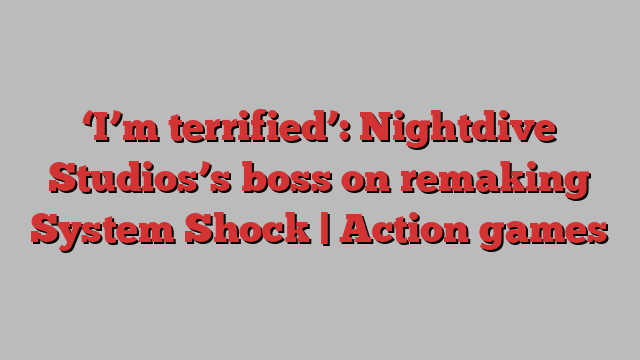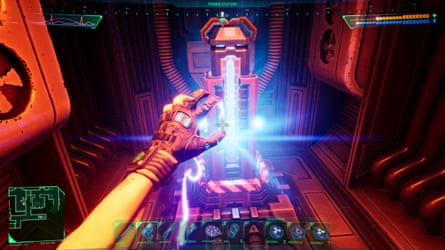
“Anxious. Excited. Terrified.” That’s how Stephen Kick, chief executive of Nightdive Studios, was feeling when I spoke to him last week, before the launch of System Shock. A remake of the 1994 cyberpunk shooter that inspired lauded games from Bioshock to Deus Ex and Dead Space, System Shock was announced in 2015, but was delayed again and again; at one point it was started again from scratch. So Kick is justifiably nervous. “We don’t yet know how this is going to be received,” he says. “Because it took so long … financially, it was the most expensive project that we’ve ever done.”
Happily for Nightdive Studios, when System Shock was released this week, it became an instant top seller – and critics liked it, too. But this was never a sure thing. Even though video game remakes are enormously popular, as demonstrated by the success of this year’s reimagining of Resident Evil 4, spending eight years rebuilding another studio’s game is a considerable commitment. For Kick and Nightdive, System Shock is more than just money-spinning digital necromancy. It is one of the reasons for the studio’s existence.

System Shock 2, launched in 1999, is one of Kick’s most treasured childhood games and the whole reason Nightdive was founded. In 2012, Kick negotiated the rights to System Shock 2, rescuing it from legal limbo, and it became the first release in Nightdive’s now-thriving business of resuscitating old games.
System Shock is Nightdive’s most ambitious project, a ground-up remake designed to give players the same feeling that Kick experienced in the 90s. The original System Shock is a significant landmark in game design: released in 1994, just a year after Doom, it was conceived as a more cerebral alternative, challenging players with taking down a malevolent AI on a space station where they could explore freely while scavenging for resources, unearthing clues in messages recorded by the deceased crew, and fighting twisted cyborgs on autonomous patrol around the station.
But as Kick explains, System Shock’s sequel is the one that broke through: people aren’t so familiar with the original, because it is harder to grapple with. “It’s not uncommon to talk to people who played System Shock 2 but have never touched the first one. It’s too old, or it’s too obtuse. They can’t figure out the controls.” Kick speaks directly from experience: “I went into [System Shock] thinking I could move the mouse to look around. That’s your first insight into what you’re getting into. Nope. You actually have to drag the mouse around the viewport.
“The whole [remake] project started because we had been working with a moderator on the systemshock.org forums, who implemented a mouse look feature for the original game. As soon as you could move around and explore in the ways that you can with any other modern game, that really started to pique our interest.”

Making System Shock more accessible is the main goal of this remake: the controls and the presentation are where Nightdive has made the most dramatic changes. Elsewhere, the studio has tried to strike a balance, modernising things where sensible without compromising the original’s spirit. “One of the hallmarks of the original System Shock is definitely the colour palette,” says Kick. “It’s bright and vibrant, and it’s not necessarily what you would think when you think horror game, especially sci-fi horror. That’s definitely something that we wanted to carry over.”
The music has been overhauled, from the incongruously upbeat original chiptune to something more foreboding. “The original music was very … dancey, for the lack of a better term,” says Kick. “We tried to find a balance between having those bright colours, but taking the music in more of a horror [direction]… everybody is dead, no one’s dancing.”
Nightdive has added some flourishes: the player character now has detailed animations when they pick up a weapon or unlock a door using a keycard. When you pick up a USB key, your character now inserts it into a drive port installed on their forearm. It fits System Shock’s cyberpunk theme, but also helps you feel more connected to them even though they are mute. “In keeping with the original, we felt it really important that we had a silent protagonist,” says Kick. “Some of the best protagonists and video games never say a word. But we also wanted to express some character with our avatar there, and that’s why you’ve got those first-person animations.”
after newsletter promotion

Looking at details like this, you can begin to see why this project has taken as long as it has – though the difficulty of the learning process has also contributed to System Shock’s protracted gestation. While Nightdive has extensive experience in remastering old games, this is the first time the studio has built one itself, and the teething problems were substantial. In 2018, System Shock’s development was rebooted after Nightdive received negative feedback from the game’s Kickstarter backers about an earlier version of the code.
I ask Kick whether Nightdive is likely to attempt such a project again. “It’s really hard to say at this point”, he says. “We have to sell quite a few copies just to break even.” It’s worth noting that Nightdive’s business remastering games is secure, not least because the studio was recently acquired by video game publisher Atari. But the willingness to work on similarly ambitious projects is there.
“If we happen to blow by that number, and the game is extremely profitable, which we’re all hoping for, then yeah,” he says. “We’ve learned a lot over the past years. We can do this better, and we can do it faster.”